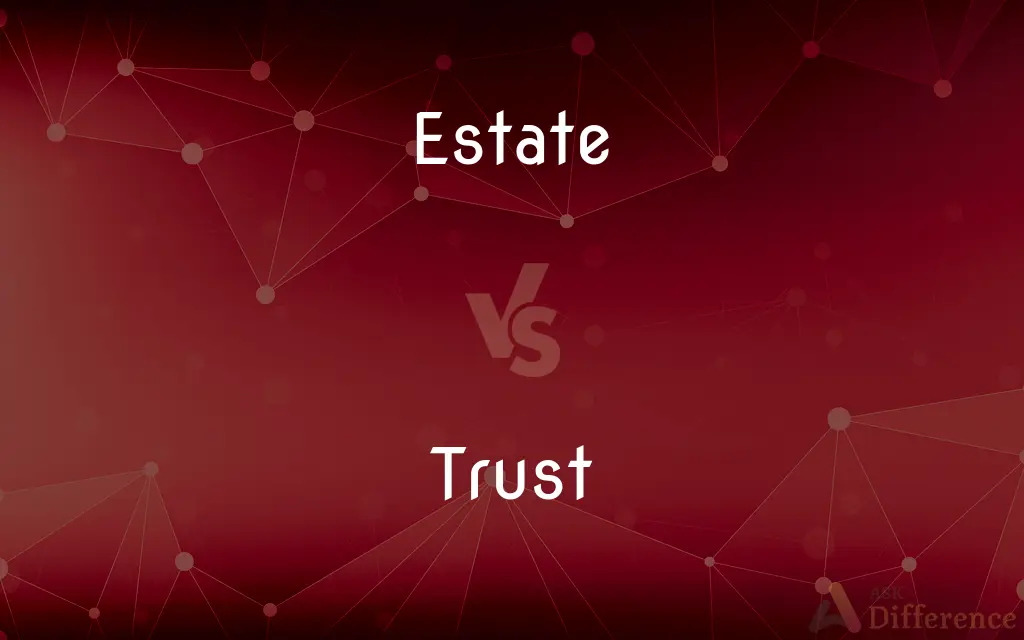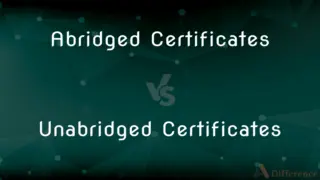Estate vs. Trust — What's the Difference?
By Tayyaba Rehman & Maham Liaqat — Published on June 17, 2024
An estate comprises all assets owned by an individual at death, while a trust is a legal arrangement allowing a third party to manage assets for beneficiaries.

Difference Between Estate and Trust
Table of Contents
ADVERTISEMENT
Key Differences
An estate represents the total assets owned by an individual at the time of their death, including property, investments, cash, and personal belongings. The management and distribution of an estate are often executed according to the deceased's will or, in the absence of a will, through state laws. The estate goes through a legal process known as probate, where debts are settled and assets are distributed to heirs.
A trust, conversely, is a legal entity created to hold assets, where one party, known as the trustee, manages the assets for the benefit of another party, the beneficiary. Trusts can be established during an individual's lifetime (living trusts) or as part of a will (testamentary trusts). Trusts are used for various purposes, including asset protection, tax planning, and avoiding probate.
Both estates and trusts involve the management and distribution of assets, but they operate in different legal frameworks. An estate is a temporary arrangement until the assets are distributed to the heirs, whereas a trust can be a long-term arrangement, potentially lasting for generations, depending on its terms.
Trusts offer more control over how and when assets are distributed to beneficiaries, which can be particularly useful for minors, individuals with special needs, or in situations where the grantor wishes to maintain some level of control over the asset distribution. Trusts can also provide privacy and efficiency, as they often avoid the probate process, unlike estates, which are subject to public record and can be time-consuming and costly to administer.
The decision between managing assets through an estate or a trust depends on individual circumstances, including the complexity of the assets, the goals for asset distribution, and concerns about privacy and probate. Many individuals use a combination of both, with certain assets passing through the estate and others managed within a trust, to achieve their overall estate planning objectives.
ADVERTISEMENT
Comparison Chart
Definition
Total assets owned at death
Legal entity for asset management
Creation
Automatically at individual's death
Established by a grantor during life or via will
Management
Through probate process or according to will
By trustee for beneficiaries
Duration
Until distribution of assets is complete
Can last indefinitely, as specified
Legal Process
Probate
Not required to go through probate
Purpose
Settle debts and distribute assets to heirs
Asset protection, tax planning, avoid probate
Privacy
Public record through probate
Private, not part of public record
Control Over Assets
Limited to will's instructions or state laws
Detailed control based on trust terms
Compare with Definitions
Estate
All assets owned at an individual's death.
Her estate included real estate, stocks, and personal items.
Trust
A legal arrangement for managing assets for beneficiaries.
She set up a trust for her grandchildren's education.
Estate
Managed based on a will or state law in absence of a will.
The executor distributed the estate as per the deceased's will.
Trust
Can avoid probate, offering privacy and efficiency.
The trust ensured immediate support for the beneficiaries without probate delays.
Estate
Subject to probate unless otherwise planned.
The estate underwent a lengthy probate process.
Trust
Managed by a trustee according to the grantor's terms.
The trustee distributed income from the trust as directed.
Estate
Distribution to heirs and settlement of debts.
After paying off debts, the estate was divided among the children.
Trust
Can be established during life or through a will.
His living trust managed his assets before and after his death.
Estate
Temporary arrangement until asset distribution.
The estate was settled within a year after the death.
Trust
Offers detailed control over asset distribution.
The trust specified conditions for beneficiaries to access funds.
Estate
A landed property, usually of considerable size.
Trust
A legal relationship in which one party holds a title to property while another party has the entitlement to the beneficial use of that property.
Estate
The nature and extent of an owner's rights with respect to land or other property.
Trust
A combination of firms or corporations for the purpose of reducing competition and controlling prices throughout a business or industry.
Estate
(obsolete) The state; the general body politic; the common-wealth; the general interest; state affairs.
Trust
A group of businessmen or traders organised for mutual benefit to produce and distribute specific commodities or services, and managed by a central body of trustees.
Estate
A property which a person possesses; a fortune; possessions, esp. property in land; also, property of all kinds which a person leaves to be divided at his death.
See what a vast estate he left his son.
Trust
An estate devised or granted in confidence that the devisee or grantee shall convey it, or dispose of the profits, at the will, or for the benefit, of another; an estate held for the use of another; a confidence respecting property reposed in one person, who is termed the trustee, for the benefit of another, who is called the cestui que trust.
Estate
The great classes or orders of a community or state (as the clergy, the nobility, and the commonalty of England) or their representatives who administer the government; as, the estates of the realm (England), which are (1) the lords spiritual, (2) the lords temporal, (3) the commons.
Trust
To give credit to; to sell to upon credit, or in confidence of future payment; as, merchants and manufacturers trust their customers annually with goods.
Estate
The degree, quality, nature, and extent of one's interest in, or ownership of, lands, tenements, etc.; as, an estate for life, for years, at will, etc.
Trust
Something (as property) held by one party (the trustee) for the benefit of another (the beneficiary);
He is the beneficiary of a generous trust set up by his father
Estate
A major social class or order of persons regarded collectively as part of the body politic of the country and formerly possessing distinct political rights
Trust
A consortium of independent organizations formed to limit competition by controlling the production and distribution of a product or service;
They set up the trust in the hope of gaining a monopoly
Common Curiosities
What is a trust?
A trust is a legal entity created to manage assets for the benefit of designated beneficiaries, according to specific terms set by the grantor.
Can a trust be part of an estate?
Yes, assets within a trust can be part of an individual's broader estate plan but are managed separately from other estate assets.
Why might someone choose to create a trust instead of a will?
For privacy, to avoid probate, and to have more control over asset distribution.
What happens to a trust after the grantor dies?
The trust continues to operate according to its terms, managed by the trustee for the benefit of the beneficiaries.
Is probate necessary for all estates?
Most estates go through probate, but some assets can bypass this process if properly structured, such as those within a trust.
How does a trust differ from an estate?
Unlike an estate, a trust can avoid probate, offers privacy, and allows detailed control over the distribution of assets.
What is an estate?
An estate encompasses all assets owned by an individual at death, managed and distributed through probate or according to a will.
What is the role of a trustee?
The trustee manages the trust's assets according to the grantor's instructions for the benefit of the beneficiaries.
What is a testamentary trust?
A testamentary trust is created as part of a will and comes into effect after the grantor's death.
How do state laws affect estates and trusts?
State laws can influence how estates are settled and the creation and administration of trusts.
Are trusts public record?
No, trusts are private arrangements and not subject to public record like probated estates.
What is probate, and why might it be avoided?
Probate is the legal process of settling an estate, which can be time-consuming and costly, reasons why many opt for creating a trust.
How can assets be protected from estate taxes?
Trusts can be used as part of tax planning strategies to minimize estate taxes.
Can a trust ensure financial support for a minor child?
Yes, trusts are often used to manage and distribute assets to minors until they reach a certain age.
Can an individual have both a will and a trust?
Yes, many people have both to cover all aspects of their estate planning needs.
Share Your Discovery

Previous Comparison
Prime Rib vs. Roast Beef
Next Comparison
Abridged Certificates vs. Unabridged CertificatesAuthor Spotlight
Written by
Tayyaba RehmanTayyaba Rehman is a distinguished writer, currently serving as a primary contributor to askdifference.com. As a researcher in semantics and etymology, Tayyaba's passion for the complexity of languages and their distinctions has found a perfect home on the platform. Tayyaba delves into the intricacies of language, distinguishing between commonly confused words and phrases, thereby providing clarity for readers worldwide.
Co-written by
Maham Liaqat












































